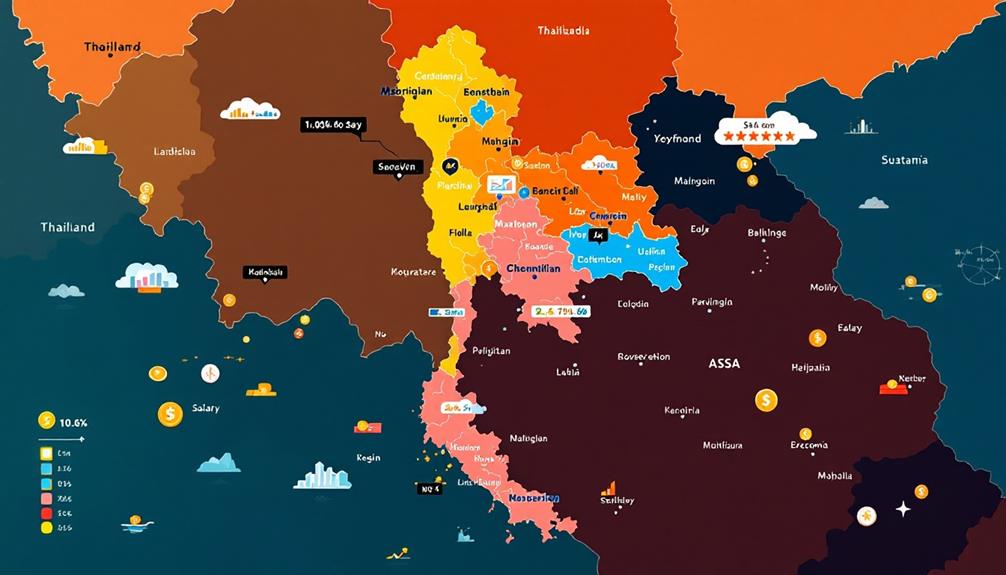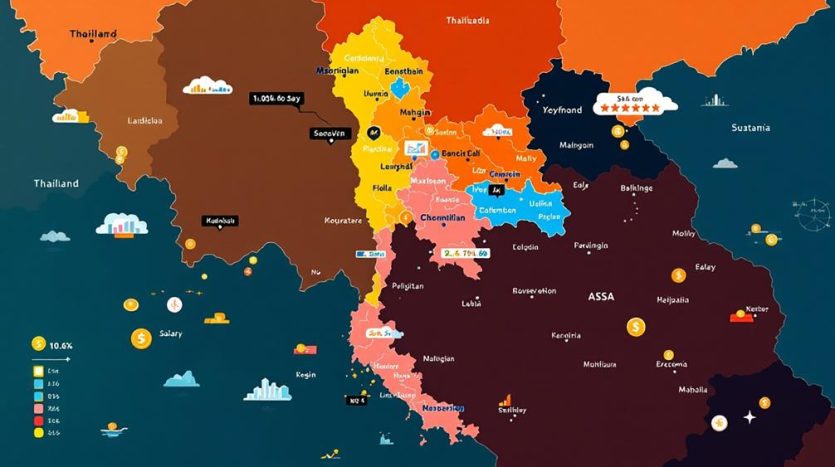What Is the Average Salary in Thailand?
Imagine you're considering a job offer in Bangkok, where the average salary hovers between THB 25,000 and 50,000 per month. You might wonder how this compares to other regions in Thailand or what factors influence these figures. Understanding the salary landscape is essential, especially if you're planning a move or contemplating a career shift. But what do these numbers really mean for your lifestyle and financial goals? As we explore the intricacies of Thailand's pay scales, you'll uncover the key elements that shape earnings and the potential for growth within various professions.
Key Takeaways
- Average salary in Bangkok ranges from THB 25,000 to 50,000 per month.
- Entry-level salaries typically range from 15,000 to 20,000 THB/month.
- Expatriate salaries can range from 60,000 to 200,000 THB/month based on industry.
- Rural areas generally have lower wages compared to urban centers.
- Technology sector offers competitive salaries, often exceeding THB 100,000 for top roles.
Overview of Thailand's Economy

Thailand's economy is a dynamic blend of agriculture, manufacturing, and services, underpinning its status as a key player in Southeast Asia. You'd think they discovered the secret sauce for economic success, right?
With agriculture contributing around 8-10% of GDP, manufacturing accounting for approximately 27%, and services making up about 60%, Thailand's economic indicators are as eclectic as a Tom Yum Goong.
Immerse yourself in the labor market, and you'll find it has the versatility of a Swiss Army knife. With low unemployment rates hovering around 1%, the labor market is as tight as a tuk-tuk ride through Bangkok traffic.
Budget-friendly dining options and affordable housing make Thailand an attractive destination for expats, contributing to its vibrant economy.
Thailand's GDP growth rate has been a roller coaster, averaging a respectable 3-4% in recent years, but sometimes taking a nosedive thanks to global economic hiccups. Exports primarily drive this growth, with electronics and automotive industries leading the charge like a well-oiled machine.
The Thai baht's exchange rate plays its part too, occasionally behaving like a mischievous monkey swinging from tree to tree. Inflation rates remain manageable, around 1-3%, ensuring you don't need a financial advisor to buy a bowl of pad thai.
Factors Influencing Salaries
When evaluating factors influencing salaries in Thailand, it's important to take into account both internal and external elements that shape wage structures. You might think of these like ingredients in a spicy Tom Yum soup—each adding its own distinct flavor.
Internally, companies consider skills, experience, and the ability to perform a successful salary negotiation. If you can negotiate your way through a crowded Bangkok market, you can probably negotiate your salary too.
Externally, several factors are at play. Inflation impact is a significant one, as rising costs of living can pressure companies to increase pay, even if it's just enough for you to afford that extra pad thai. With affordable housing and budget-friendly dining options, managing living expenses in Thailand can be less overwhelming despite salary constraints. It's like a game of economic Twister, where one wrong move can topple your financial stability.
Here are a few key elements that influence salaries in Thailand:
- Economic Conditions: A struggling economy might tighten company wallets, making salary raises as rare as finding a quiet tuk-tuk ride.
- Industry Demand: High-demand sectors may offer more lucrative salaries. Think of it as the salary equivalent of peak tourist season.
- Government Policies: Regulations and minimum wage laws provide a floor, ensuring you don't fall through the financial cracks.
Understanding these factors can help you navigate the salary landscape with the grace of a Thai dancer.
Salary Differences by Region

Regional salary differences in Thailand reveal a complex landscape influenced by economic activity, cost of living, and local industry presence. You might think of it as a salary safari—an adventure through the jungles of wages, where economic influences lurk behind every tree.
Rural wages typically lag behind their urban counterparts, much like a tortoise in a race against a hare. This gap is often due to limited local employment opportunities and the dominance of agricultural industries in rural areas, offering fewer high-paying roles.
In urban areas, access to resources like utility costs also plays a role in living expenses and salary expectations. In contrast, urban disparities in wages are more pronounced, fueled by the concentration of industries and services in these bustling hubs.
The regional variations mean that someone in a remote village might earn enough to buy a modest meal, while their city cousin is busy ordering avocado toast with a side of irony. These differences highlight how local employment availability and economic influences shape earning potential.
Salaries in Major Cities
Exploring the salary landscape in Thailand's major cities reveals a stark contrast to rural areas, where economic opportunities and industries are more concentrated.
Let's examine the numbers, shall we? In Bangkok, the city that never sleeps (due to traffic), salaries are generally higher due to its buzzing local job market. You're looking at average salaries around THB 25,000-50,000 per month, depending on your skill set and ability to navigate the metro system.
For those interested in property investment, foreign ownership laws in Thailand allow for condominium purchases, but with restrictions that may impact financial planning.
Chiang Mai, a city known for its temples and slightly slower pace, offers wages that are typically lower than Bangkok. Here, you might find Chiang Mai wages hovering around THB 20,000-35,000. But hey, at least you get a beautiful mountain view along with your paycheck.
Phuket, famous for its beaches and tourists, sees income varying greatly. Seasonal Pattaya earnings can make you feel like you're on a financial rollercoaster. Expect Phuket income to range from THB 18,000-40,000, with jumps during peak tourist seasons.
- Bangkok salaries: THB 25,000-50,000
- Chiang Mai wages: THB 20,000-35,000
- Phuket income: THB 18,000-40,000
Mind these regional disparities and adjust your city living salary expectations accordingly.
Industry-Specific Salary Insights

Understanding industry-specific salary insights in Thailand requires a data-driven approach. You don't just want to guess what the salary benchmarks are; instead, plunge into the numbers like they're a pool on a sweltering Bangkok afternoon.
Let's explore the jungle of industry trends, starting with technology. This sector's been a rising star, offering competitive salaries that even a tuk-tuk driver would find impressive, with benchmark figures showing salaries often exceeding THB 100,000 per month for top roles. In areas like urban Bangkok, high demand and regional amenities contribute to the overall cost of living, which is reflected in these competitive salaries.
In contrast, the hospitality industry, while vibrant, offers a more modest paycheck. Employees here often earn around THB 30,000 monthly. It's a bit like comparing an elephant to a gecko – both fascinating, but one's definitely heftier.
The manufacturing sector presents a mixed bag, with salaries fluctuating based on specialization and demand. Here, expect anywhere between THB 20,000 to 50,000. It's like sorting through a bag of durians – some are worth more than others.
Lastly, the healthcare industry holds stable salaries with a healthy dose of respect, ranging from THB 40,000 to 80,000.
Entry-Level vs. Experienced Salaries
When comparing entry-level and experienced salaries in Thailand, you'll notice significant variances across industries.
Entry-level positions often command lower wages, but experienced professionals can see their earnings increase by over 50% depending on their sector.
Entry-Level Salary Insights
Maneuvering the landscape of entry-level salaries in Thailand reveals significant disparities when compared to the earnings of experienced professionals.
As you navigate the job market, setting your entry-level expectations can feel like guessing how many jellybeans are in a jar—possible but mighty challenging. The data shows that entry-level roles often offer lower wages, reflecting a global trend where fresh graduates are typically paid less than their seasoned counterparts.
There's a silver lining, though: the variety of fields and roles can provide different paths to growth.
Here are some insights to keep your expectations grounded and your spirits high:
- Average Salary: Entry-level positions in Thailand average around 15,000 to 20,000 baht per month, depending on the industry. It's not exactly a treasure chest, but hey, you're just starting out!
- Industry Variations: Tech and engineering sectors tend to pay more than hospitality or retail. It's like choosing between a fancy steakhouse and a fast-food joint.
- Location Impact: Bangkok offers higher salaries compared to rural areas, akin to how a big city coffee shop charges more than your neighborhood café.
Experienced Professionals Earnings
Delving into the earnings of experienced professionals in Thailand, you'll notice a substantial leap compared to entry-level salaries. It's almost like winning the salary lottery, but without the confetti or the risk of sharing with distant relatives.
Professionals who've honed their skills over the years often command salaries that reflect their advanced professional skillsets. While entry-level positions see you scraping by on a modest sum, experienced professionals find themselves comfortably nestled in higher salary brackets.
The salary benchmarks in Thailand for experienced workers vary, but the numbers tell a promising story. For instance, those with 5-10 years of experience might enjoy a 30-50% increase over their starting wages.
And if you hang in there for over a decade, your paycheck might just double. This progression highlights the value of investing in skill development and networking.
But let's not kid ourselves—experience alone doesn't guarantee wealth. Your bank account's health depends on aligning your professional skillsets with market demand.
Industry-Specific Salary Differences
While experienced professionals in Thailand enjoy significant salary growth over time, it's important to examine how these earnings differ across various industries.
If you're diving into the technology sector, expect a stark contrast between entry-level positions and seasoned experts. While fresh graduates might start with a modest income, seasoned tech wizards often command impressive salaries that could make you question your career choices.
In healthcare, salaries fluctuate based on specialization and experience. Entry-level nurses and doctors may earn less, but as they climb the professional ladder, their paychecks grow healthier too.
Meanwhile, tourism wages can resemble a rollercoaster, with entry-level roles often offering more thrills than dollar bills, while experienced managers might see more consistent compensation.
Consider these industry-specific quirks:
- Manufacturing pay: Entry-level workers earn relatively low wages, but skilled veterans can see their salaries multiply.
- Finance earnings: Entry-level analysts start with decent pay, but the real treasure is unearthed by experienced bankers.
- Education compensation: Teachers face modest beginnings, yet their earnings gradually improve with tenure.
Whether you're drawn to agriculture income or tempted by retail salaries, each sector shows unique patterns.
Average Salaries for Expatriates

For expatriates considering a move to Thailand, understanding the average salaries in the country is essential for financial planning. You're probably wondering how much you can earn while sipping coconuts on a sandy beach.
Well, the expat job market in Thailand is as varied as its street food menu. Depending on your industry and experience, salaries can range from 60,000 to 200,000 THB per month.
IT professionals and engineers usually find themselves on the higher end of the spectrum, while English teachers might earn closer to 30,000 to 50,000 THB.
But don't let those figures scare you off. The cost of living in Thailand is considerably lower than in Western countries, and expat benefits often include housing allowances, health insurance, and even school tuition for your little ones.
Thailand's job market is competitive, yet opportunities abound in sectors like tourism, finance, and manufacturing.
Just remember, landing a gig might require patience and a knack for networking—think less "LinkedIn" and more "let's grab a drink."
Despite the challenges, working in Thailand could be your ticket to an adventurous lifestyle with a salary that keeps the pad Thai and Chang beers flowing.
Comparison With Neighboring Countries
When comparing Thailand's average salaries to those of its neighboring countries, it's essential to take into account various economic factors.
You've got salary disparities, regional variations, and the occasional mystery of why your paycheck disappears faster than a plate of pad thai. Thailand's average salary is generally lower compared to countries like Malaysia and Singapore, but higher than in countries such as Cambodia and Myanmar.
But why the discrepancies?
- Economic Development: Malaysia and Singapore enjoy more robust economies, leading to higher salaries. Thailand, while developing, hasn't quite caught up yet.
- Regional Variations: Within each country, salaries differ markedly between urban and rural areas. Bangkok, for instance, offers higher salaries than rural regions, much like Kuala Lumpur or Singapore City.
- Industries and Job Markets: Thailand's economy leans heavily on agriculture and tourism, which typically offer lower salaries compared to tech and finance sectors in Singapore.
When you look at these salary disparities and regional variations, the differences make sense. It's like comparing mangoes to durians—similar yet distinct.
Cost of Living Considerations

In considering the cost of living in Thailand, it's important to analyze how it aligns with average salaries. You might think, "Will my money go further here, or will I be left wondering where it all went?" Let's break it down. Housing expenses are typically the largest chunk of your budget, but Thailand offers a spectrum from budget-friendly apartments to luxurious condos. Transportation costs are relatively low, thanks to affordable public transport. However, if you're cruising around in a tuk-tuk every day, you may feel the pinch.
| Category | Average Monthly Cost (THB) | Notes |
|---|---|---|
| Housing Expenses | 5,000 – 15,000 | Varies by location and accommodation |
| Transportation Costs | 1,500 – 3,000 | Public transport is cost-effective |
| Food Prices | 3,000 – 7,000 | Depends on dining habits |
| Healthcare Expenses | 2,000 – 5,000 | Quality varies between public and private |
Food prices can swing from cheap street food to high-end dining. Healthcare expenses, education fees, and utility bills are relatively reasonable, but keep an eye on inflation rates—those pesky numbers can sneak up. Leisure spending is the wild card; how much you spend depends on your definition of fun.
Trends in Salary Growth
Examining salary growth trends in Thailand reveals a dynamic landscape influenced by economic shifts and industry demands. You've probably noticed that salary projections can be as unpredictable as a cat on a hot tin roof.
However, analyzing historical trends provides some insight into what's been happening. Over the past decade, salaries in Thailand have generally seen an upward trajectory, with fluctuations mirroring the country's economic performance and sector-specific demands.
- Technology Boom: The tech industry is like that trendy coffee shop on the corner—always buzzing. It's been a significant driver of salary growth, with positions in IT and digital marketing seeing impressive increases.
- Manufacturing and Exports: These sectors are the sturdy, dependable types. They've experienced steady growth, thanks to Thailand's vital role in global supply chains, even if they're not as flashy as tech.
- Hospitality and Tourism: This sector is the roller coaster of the salary world. Salary projections can be volatile, largely influenced by global travel trends and occasional unexpected events (hello, pandemics).
While the overall trend is positive, it's important to understand that not all sectors grow equally. Being aware of these disparities can help you navigate the job market like a pro without losing your shirt—or your sense of humor.
Tips for Negotiating Salaries

How can you effectively negotiate your salary in Thailand's evolving job market?
First, arm yourself with data. Research industry standards using reliable sources like the National Statistical Office of Thailand. You wouldn't want to ask for a CEO's salary if you're applying for an entry-level position, right?
Effective communication is your secret weapon. Think of it as a game where you play your cards right. Highlight your skills and achievements with confidence, but don't sound like you're bragging about surviving a karaoke night.
When engaging in salary negotiation, timing is everything. Approach the topic once you've impressed them, not before you've even shaken hands. Remember, you're not bargaining for a souvenir at Chatuchak Market—be professional.
Aim for a win-win scenario where both you and your employer feel like you've conquered a mountain (or at least a small hill).
Lastly, be open to non-monetary benefits. If they can't bump up your salary, maybe you can snag extra vacation days or a more flexible work schedule.
Thailand's job market might be evolving, but with these strategies, you'll navigate it with the finesse of a tuk-tuk driver in Bangkok traffic.
Imagine you’re considering a job offer in Bangkok, where the average salary hovers between THB 25,000 and 50,000 per month. You might wonder how this compares to other regions in Thailand or what factors influence these figures. Understanding the salary landscape is essential, especially if you’re planning a move or contemplating a career shift. But what do these numbers really mean for your lifestyle and financial goals? As we explore the intricacies of Thailand’s pay scales, you’ll uncover the key elements that shape earnings and the potential for growth within various professions.
Key Takeaways
- Average salary in Bangkok ranges from THB 25,000 to 50,000 per month.
- Entry-level salaries typically range from 15,000 to 20,000 THB/month.
- Expatriate salaries can range from 60,000 to 200,000 THB/month based on industry.
- Rural areas generally have lower wages compared to urban centers.
- Technology sector offers competitive salaries, often exceeding THB 100,000 for top roles.
Overview of Thailand’s Economy

Thailand’s economy is a dynamic blend of agriculture, manufacturing, and services, underpinning its status as a key player in Southeast Asia. You’d think they discovered the secret sauce for economic success, right?
With agriculture contributing around 8-10% of GDP, manufacturing accounting for approximately 27%, and services making up about 60%, Thailand’s economic indicators are as eclectic as a Tom Yum Goong.
Immerse yourself in the labor market, and you’ll find it has the versatility of a Swiss Army knife. With low unemployment rates hovering around 1%, the labor market is as tight as a tuk-tuk ride through Bangkok traffic.
Budget-friendly dining options and affordable housing make Thailand an attractive destination for expats, contributing to its vibrant economy.
Thailand’s GDP growth rate has been a roller coaster, averaging a respectable 3-4% in recent years, but sometimes taking a nosedive thanks to global economic hiccups. Exports primarily drive this growth, with electronics and automotive industries leading the charge like a well-oiled machine.
The Thai baht’s exchange rate plays its part too, occasionally behaving like a mischievous monkey swinging from tree to tree. Inflation rates remain manageable, around 1-3%, ensuring you don’t need a financial advisor to buy a bowl of pad thai.
Factors Influencing Salaries
When evaluating factors influencing salaries in Thailand, it’s important to take into account both internal and external elements that shape wage structures. You might think of these like ingredients in a spicy Tom Yum soup—each adding its own distinct flavor.
Internally, companies consider skills, experience, and the ability to perform a successful salary negotiation. If you can negotiate your way through a crowded Bangkok market, you can probably negotiate your salary too.
Externally, several factors are at play. Inflation impact is a significant one, as rising costs of living can pressure companies to increase pay, even if it’s just enough for you to afford that extra pad thai. With affordable housing and budget-friendly dining options, managing living expenses in Thailand can be less overwhelming despite salary constraints. It’s like a game of economic Twister, where one wrong move can topple your financial stability.
Here are a few key elements that influence salaries in Thailand:
- Economic Conditions: A struggling economy might tighten company wallets, making salary raises as rare as finding a quiet tuk-tuk ride.
- Industry Demand: High-demand sectors may offer more lucrative salaries. Think of it as the salary equivalent of peak tourist season.
- Government Policies: Regulations and minimum wage laws provide a floor, ensuring you don’t fall through the financial cracks.
Understanding these factors can help you navigate the salary landscape with the grace of a Thai dancer.
Salary Differences by Region

Regional salary differences in Thailand reveal a complex landscape influenced by economic activity, cost of living, and local industry presence. You might think of it as a salary safari—an adventure through the jungles of wages, where economic influences lurk behind every tree.
Rural wages typically lag behind their urban counterparts, much like a tortoise in a race against a hare. This gap is often due to limited local employment opportunities and the dominance of agricultural industries in rural areas, offering fewer high-paying roles.
In urban areas, access to resources like utility costs also plays a role in living expenses and salary expectations. In contrast, urban disparities in wages are more pronounced, fueled by the concentration of industries and services in these bustling hubs.
The regional variations mean that someone in a remote village might earn enough to buy a modest meal, while their city cousin is busy ordering avocado toast with a side of irony. These differences highlight how local employment availability and economic influences shape earning potential.
Salaries in Major Cities
Exploring the salary landscape in Thailand’s major cities reveals a stark contrast to rural areas, where economic opportunities and industries are more concentrated.
Let’s examine the numbers, shall we? In Bangkok, the city that never sleeps (due to traffic), salaries are generally higher due to its buzzing local job market. You’re looking at average salaries around THB 25,000-50,000 per month, depending on your skill set and ability to navigate the metro system.
For those interested in property investment, foreign ownership laws in Thailand allow for condominium purchases, but with restrictions that may impact financial planning.
Chiang Mai, a city known for its temples and slightly slower pace, offers wages that are typically lower than Bangkok. Here, you might find Chiang Mai wages hovering around THB 20,000-35,000. But hey, at least you get a beautiful mountain view along with your paycheck.
Phuket, famous for its beaches and tourists, sees income varying greatly. Seasonal Pattaya earnings can make you feel like you’re on a financial rollercoaster. Expect Phuket income to range from THB 18,000-40,000, with jumps during peak tourist seasons.
- Bangkok salaries: THB 25,000-50,000
- Chiang Mai wages: THB 20,000-35,000
- Phuket income: THB 18,000-40,000
Mind these regional disparities and adjust your city living salary expectations accordingly.
Industry-Specific Salary Insights

Understanding industry-specific salary insights in Thailand requires a data-driven approach. You don’t just want to guess what the salary benchmarks are; instead, plunge into the numbers like they’re a pool on a sweltering Bangkok afternoon.
Let’s explore the jungle of industry trends, starting with technology. This sector’s been a rising star, offering competitive salaries that even a tuk-tuk driver would find impressive, with benchmark figures showing salaries often exceeding THB 100,000 per month for top roles. In areas like urban Bangkok, high demand and regional amenities contribute to the overall cost of living, which is reflected in these competitive salaries.
In contrast, the hospitality industry, while vibrant, offers a more modest paycheck. Employees here often earn around THB 30,000 monthly. It’s a bit like comparing an elephant to a gecko – both fascinating, but one’s definitely heftier.
The manufacturing sector presents a mixed bag, with salaries fluctuating based on specialization and demand. Here, expect anywhere between THB 20,000 to 50,000. It’s like sorting through a bag of durians – some are worth more than others.
Lastly, the healthcare industry holds stable salaries with a healthy dose of respect, ranging from THB 40,000 to 80,000.
Entry-Level vs. Experienced Salaries
When comparing entry-level and experienced salaries in Thailand, you’ll notice significant variances across industries.
Entry-level positions often command lower wages, but experienced professionals can see their earnings increase by over 50% depending on their sector.
Entry-Level Salary Insights
Maneuvering the landscape of entry-level salaries in Thailand reveals significant disparities when compared to the earnings of experienced professionals.
As you navigate the job market, setting your entry-level expectations can feel like guessing how many jellybeans are in a jar—possible but mighty challenging. The data shows that entry-level roles often offer lower wages, reflecting a global trend where fresh graduates are typically paid less than their seasoned counterparts.
There’s a silver lining, though: the variety of fields and roles can provide different paths to growth.
Here are some insights to keep your expectations grounded and your spirits high:
- Average Salary: Entry-level positions in Thailand average around 15,000 to 20,000 baht per month, depending on the industry. It’s not exactly a treasure chest, but hey, you’re just starting out!
- Industry Variations: Tech and engineering sectors tend to pay more than hospitality or retail. It’s like choosing between a fancy steakhouse and a fast-food joint.
- Location Impact: Bangkok offers higher salaries compared to rural areas, akin to how a big city coffee shop charges more than your neighborhood café.
Experienced Professionals Earnings
Delving into the earnings of experienced professionals in Thailand, you’ll notice a substantial leap compared to entry-level salaries. It’s almost like winning the salary lottery, but without the confetti or the risk of sharing with distant relatives.
Professionals who’ve honed their skills over the years often command salaries that reflect their advanced professional skillsets. While entry-level positions see you scraping by on a modest sum, experienced professionals find themselves comfortably nestled in higher salary brackets.
The salary benchmarks in Thailand for experienced workers vary, but the numbers tell a promising story. For instance, those with 5-10 years of experience might enjoy a 30-50% increase over their starting wages.
And if you hang in there for over a decade, your paycheck might just double. This progression highlights the value of investing in skill development and networking.
But let’s not kid ourselves—experience alone doesn’t guarantee wealth. Your bank account’s health depends on aligning your professional skillsets with market demand.
Industry-Specific Salary Differences
While experienced professionals in Thailand enjoy significant salary growth over time, it’s important to examine how these earnings differ across various industries.
If you’re diving into the technology sector, expect a stark contrast between entry-level positions and seasoned experts. While fresh graduates might start with a modest income, seasoned tech wizards often command impressive salaries that could make you question your career choices.
In healthcare, salaries fluctuate based on specialization and experience. Entry-level nurses and doctors may earn less, but as they climb the professional ladder, their paychecks grow healthier too.
Meanwhile, tourism wages can resemble a rollercoaster, with entry-level roles often offering more thrills than dollar bills, while experienced managers might see more consistent compensation.
Consider these industry-specific quirks:
- Manufacturing pay: Entry-level workers earn relatively low wages, but skilled veterans can see their salaries multiply.
- Finance earnings: Entry-level analysts start with decent pay, but the real treasure is unearthed by experienced bankers.
- Education compensation: Teachers face modest beginnings, yet their earnings gradually improve with tenure.
Whether you’re drawn to agriculture income or tempted by retail salaries, each sector shows unique patterns.
Average Salaries for Expatriates

For expatriates considering a move to Thailand, understanding the average salaries in the country is essential for financial planning. You’re probably wondering how much you can earn while sipping coconuts on a sandy beach.
Well, the expat job market in Thailand is as varied as its street food menu. Depending on your industry and experience, salaries can range from 60,000 to 200,000 THB per month.
IT professionals and engineers usually find themselves on the higher end of the spectrum, while English teachers might earn closer to 30,000 to 50,000 THB.
But don’t let those figures scare you off. The cost of living in Thailand is considerably lower than in Western countries, and expat benefits often include housing allowances, health insurance, and even school tuition for your little ones.
Thailand’s job market is competitive, yet opportunities abound in sectors like tourism, finance, and manufacturing.
Just remember, landing a gig might require patience and a knack for networking—think less "LinkedIn" and more "let’s grab a drink."
Despite the challenges, working in Thailand could be your ticket to an adventurous lifestyle with a salary that keeps the pad Thai and Chang beers flowing.
Comparison With Neighboring Countries
When comparing Thailand’s average salaries to those of its neighboring countries, it’s essential to take into account various economic factors.
You’ve got salary disparities, regional variations, and the occasional mystery of why your paycheck disappears faster than a plate of pad thai. Thailand’s average salary is generally lower compared to countries like Malaysia and Singapore, but higher than in countries such as Cambodia and Myanmar.
But why the discrepancies?
- Economic Development: Malaysia and Singapore enjoy more robust economies, leading to higher salaries. Thailand, while developing, hasn’t quite caught up yet.
- Regional Variations: Within each country, salaries differ markedly between urban and rural areas. Bangkok, for instance, offers higher salaries than rural regions, much like Kuala Lumpur or Singapore City.
- Industries and Job Markets: Thailand’s economy leans heavily on agriculture and tourism, which typically offer lower salaries compared to tech and finance sectors in Singapore.
When you look at these salary disparities and regional variations, the differences make sense. It’s like comparing mangoes to durians—similar yet distinct.
Cost of Living Considerations

In considering the cost of living in Thailand, it’s important to analyze how it aligns with average salaries. You might think, "Will my money go further here, or will I be left wondering where it all went?" Let’s break it down. Housing expenses are typically the largest chunk of your budget, but Thailand offers a spectrum from budget-friendly apartments to luxurious condos. Transportation costs are relatively low, thanks to affordable public transport. However, if you’re cruising around in a tuk-tuk every day, you may feel the pinch.
| Category | Average Monthly Cost (THB) | Notes |
|---|---|---|
| Housing Expenses | 5,000 – 15,000 | Varies by location and accommodation |
| Transportation Costs | 1,500 – 3,000 | Public transport is cost-effective |
| Food Prices | 3,000 – 7,000 | Depends on dining habits |
| Healthcare Expenses | 2,000 – 5,000 | Quality varies between public and private |
Food prices can swing from cheap street food to high-end dining. Healthcare expenses, education fees, and utility bills are relatively reasonable, but keep an eye on inflation rates—those pesky numbers can sneak up. Leisure spending is the wild card; how much you spend depends on your definition of fun.
Trends in Salary Growth
Examining salary growth trends in Thailand reveals a dynamic landscape influenced by economic shifts and industry demands. You’ve probably noticed that salary projections can be as unpredictable as a cat on a hot tin roof.
However,










